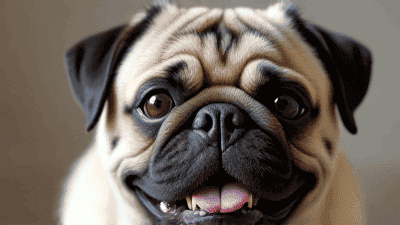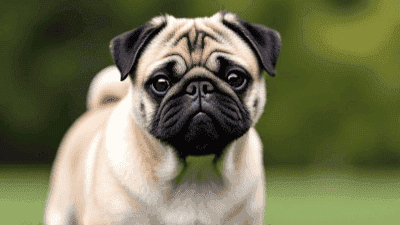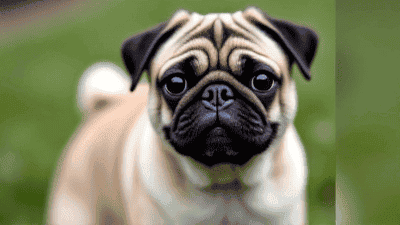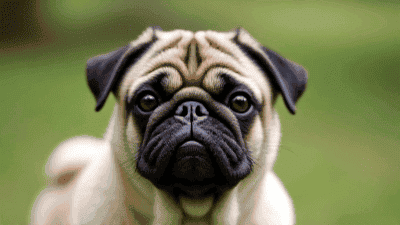The Charming Pug: Social Needs and Health Considerations for Your Flat-Faced Friend
- 99,462

The Pug is a breed that has captured the hearts of dog lovers worldwide with its distinctive wrinkled face, expressive eyes, and playful personality. Known for their friendly and affectionate nature, Pugs make excellent companions for families, singles, and seniors alike. However, like all breeds, Pugs have specific social needs and health considerations that potential owners should be aware of.
The Pug is an ancient breed with roots tracing back to China, where they were treasured by emperors and often kept as royal companions. They were later introduced to Europe in the 16th century, where they became popular among European nobility.
The Pug’s charm and unique appearance led to its recognition by kennel clubs worldwide. Today, the Pug is one of the most beloved toy breeds, known for its playful and affectionate nature.

Pugs are known for their loving and loyal nature. They thrive on human companionship and enjoy being part of family activities.
Despite their small size, Pugs have a big personality. They are playful, and energetic, and enjoy entertaining their owners with their antics.
Pugs are highly social dogs that get along well with people, children, and other pets. Their friendly disposition makes them excellent companions for families.
Pugs are adaptable to various living situations, whether in an apartment or a house with a yard. They are content as long as they are with their loved ones.
Pugs are people-oriented dogs that crave attention and affection. They thrive in households where they are included in daily activities and receive plenty of love and attention.
Pugs generally get along well with other dogs and pets. Early socialization is key to ensuring they develop positive interactions with other animals.
While Pugs are not high-energy dogs, they still need regular playtime and exercise to stay healthy and happy. Short walks, play sessions, and interactive toys are great ways to keep them engaged.
Pugs are intelligent dogs that enjoy mental stimulation. Puzzle toys, training sessions, and games can help keep their minds sharp and prevent boredom.

Due to their flat faces, Pugs are prone to brachycephalic syndrome, a condition that affects their breathing. Symptoms include snoring, wheezing, and difficulty breathing, especially in hot or humid weather.
Pugs’ prominent eyes make them susceptible to eye injuries and conditions such as corneal ulcers, dry eye, and proptosis (eye dislocation). Regular eye care and monitoring are essential.
The Pug’s wrinkled skin requires special attention to prevent infections and irritation. Regularly cleaning and drying their wrinkles can help keep their skin healthy.
Pugs love food and are prone to obesity, which can exacerbate health issues. A balanced diet and regular exercise are crucial to maintaining a healthy weight.
Pugs can be prone to hip dysplasia, patellar luxation, and other joint issues. Maintaining a healthy weight and providing joint supplements can help support their joint health.
Pugs may develop allergies to food, environmental factors, or grooming products. Monitoring for symptoms like itching, redness, and ear infections can help identify and manage allergies.
Pugs have a short, smooth coat that is relatively low-maintenance. Regular brushing helps remove loose hair and keep their coat shiny.
Clean your Pug’s wrinkles daily with a damp cloth and dry them thoroughly to prevent infections. Pay special attention to the deep folds around the nose and eyes.
Pugs’ floppy ears can trap moisture and debris, leading to ear infections. Regularly check and clean their ears to keep them healthy.
Trim your Pug’s nails regularly to prevent overgrowth and discomfort. If you’re unsure how to do this, consult your vet or a professional groomer.
Pugs are prone to dental problems, so regular toothbrushing and dental chews are essential to maintain their oral health.

Pugs respond well to positive reinforcement training. Use treats, praise, and playtime to reward good behavior and encourage learning.
Consistency is key when training a Pug. Establish clear rules and routines to help them understand what is expected.
Early socialization is crucial for Pugs to develop into well-rounded dogs. Expose them to different people, animals, and environments to build their confidence.
Pugs can be stubborn, so patience is essential during training. Keep sessions short and fun to maintain their interest and focus.
Feed your Pug a high-quality, balanced diet that meets their nutritional needs. Look for dog food formulated for small breeds or specific to Pugs.
Pugs are prone to obesity, so it’s important to control their portion sizes and avoid overfeeding. Follow feeding guidelines based on their age, weight, and activity level.
Some Pugs may have allergies or sensitivities that require a special diet. Consult your vet if you suspect your Pug has food allergies.
Limit treats to avoid weight gain and choose healthy options like fruits, vegetables, or low-calorie dog treats.
Pugs require moderate exercise to stay fit and healthy. Short walks, playtime, and interactive games are ideal for this breed.
Due to their brachycephalic nature, Pugs can easily overheat and struggle with breathing during intense exercise. Avoid overexertion, especially in hot or humid weather.
Incorporate mental stimulation into your Pug’s routine to keep them engaged and prevent boredom. Puzzle toys, training sessions, and games are great options.
Fact: While Pugs enjoy lounging, they are also playful and energetic. They need regular exercise to stay healthy.
Fact: Pugs are intelligent dogs that benefit from training and mental stimulation. Training helps them develop good behavior and strengthens the bond with their owner.
Fact: Pugs are prone to several health issues, especially due to their brachycephalic nature. Regular vet check-ups and proper care are essential to maintain their health.
Schedule regular vet check-ups to monitor your Pug’s health and address any issues early.
Stay up-to-date on vaccinations, flea and tick prevention, and heartworm medication to protect your Pug from common health threats.
Keep an eye on your Pug’s weight and adjust their diet and exercise routine as needed to prevent obesity.
Spend quality time with your Pug to strengthen your bond and provide them with the love and attention they crave.
The Pug is a charming and affectionate breed that brings joy and companionship to any household. Understanding their social needs and health considerations is key to providing them with a happy and fulfilling life. By meeting their need for companionship, providing proper care, and staying vigilant about their health, you can ensure your flat-faced friend thrives. With their playful personality and loving nature, Pugs truly are one of the most delightful breeds to share your life with.